Speakers:
Stacy Jeanne Kosko (University of Maryland)
Pedro Hernando Maldonado Castañeda (Universitat de Barcelona)
Roni Kay O’Dell (Seton Hill)
Rithvik Yarlagadda (University of Maryland)

Speakers:
Stacy Jeanne Kosko (University of Maryland)
Pedro Hernando Maldonado Castañeda (Universitat de Barcelona)
Roni Kay O’Dell (Seton Hill)
Rithvik Yarlagadda (University of Maryland)
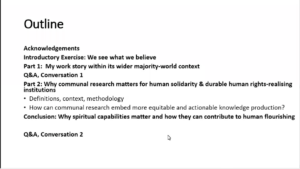
The Human Rights Thematic Group hosts a presentation by TG member Bill Walker, Ridley College, Melbourne, who picks up from Dustin Sharp’s recent talk to the HDCA Human Rights Thematic Group introducing the concept of a “larger we” (https://hd-ca.org/videos/a-larger-we-spirituality-identity-human-rights-and-social-change). In this presentation he describes his own spiritual journey of engaging with injustice through advocacy and other action for, with, and by communities.
HDCA Webinar 2023 Human Rights HDCA Videos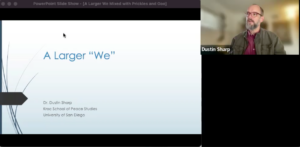
Dustin Sharp, Associate Professor at the Kroc School of Peace Studies at the University of San Diego.
Dustin Sharp formerly served as researcher for Francophone West Africa at Human Rights Watch. He has published with Human Rights Quarterly and the Journal of Human Rights. He is the author of Rethinking Transitional Justice for the 21st Century: Beyond the End of History (CUP 2018).
HDCA Webinar 2022 Human Rights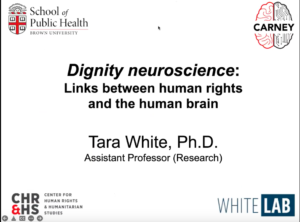
Presented by Dr. Tara White, Assistant Professor of Behavioral and Social Sciences (Research) and the founding director of the Laboratory of Affective Neuroscience at Brown University
Neuroscientist and psychology researcher Tara White proposes that protections provided by international human rights instruments are rooted in fundamental properties of the human brain. The emerging field that she has named dignity neuroscience stems from her and others’ work in human brain science and human emotions. Dr. White proposes a framework that provides an empirical foundation to support and foster human dignity, universal rights, and their active furtherance by individuals, nations, and international law. It incorporates understandings of brain structures involved in agency, autonomy, and self-determination, the harms of privation and maltreatment, and the concept of intrinsic human dignity expressed in longstanding cultural, religious, and philosophical traditions.
HDCA Webinar 2022 Human Rights HDCA Videos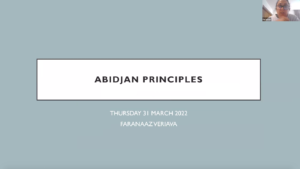
A conversation with Dr. Faranaaz Veriava
Adopted in 2019, the Abidjan Principles lay out governments’ international legal obligations in the area of education to ensure education rights do not get undermined by private actors. Dr. Faranaaz Veriava, who served on the advisory committee to the drafting team, describes how the principles have been used by education advocates in litigation and advocacy. Enough time will be put aside to ensure participants have the chance to ask questions and to engage with each other.
HDCA Webinar 2022 Education Human Rights HDCA Videos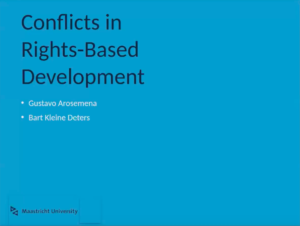
Gustavo Arosemena, assistant professor at the Maastricht Centre for Human Rights, and Bart Kleine Deters, a senior researcher at ECBO, a Dutch education research center, speak about their book chapter “Conflicts in Human Rights-Based Development”. The authors note that it has become increasingly common to define development in terms of rights. However, they write,
What is rarely recognized is that even if development is conceptualized in terms of rights, it remains a conflictive process. Normally it is not possible to satisfy the rights or claims to development of all needy parties. Consequently, there is a need to make choices, to make trade-offs. How this squares with talk of ‘rights’ is not well understood. Existing theories of rights-based development say little about conflicts or how to solve them. (Arosemena & Kleine Deters, 2020, p. 242)
HDCA Webinar 2022 Human Rights HDCA Videos